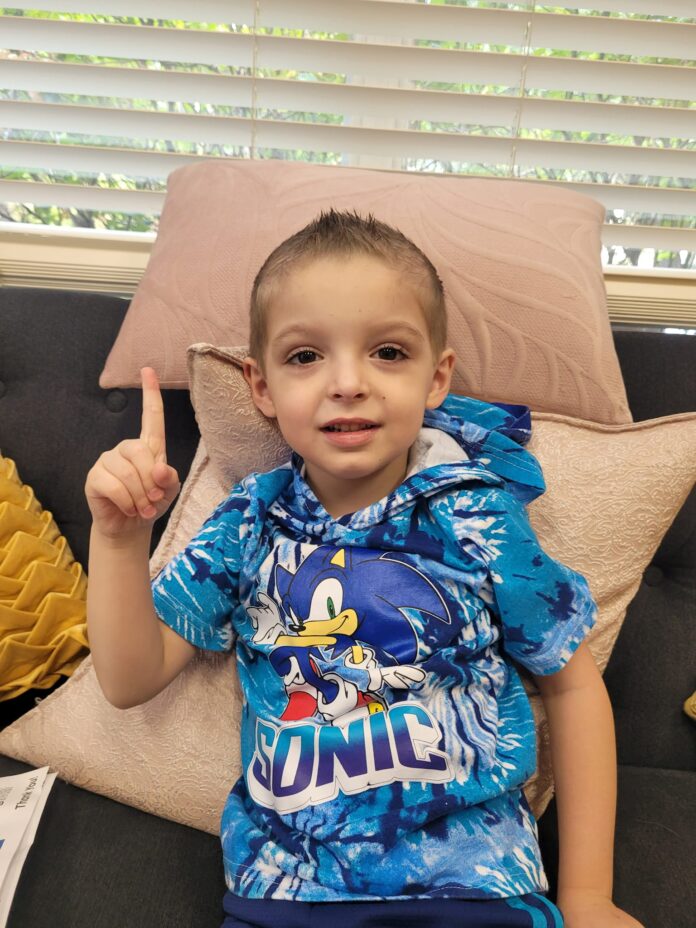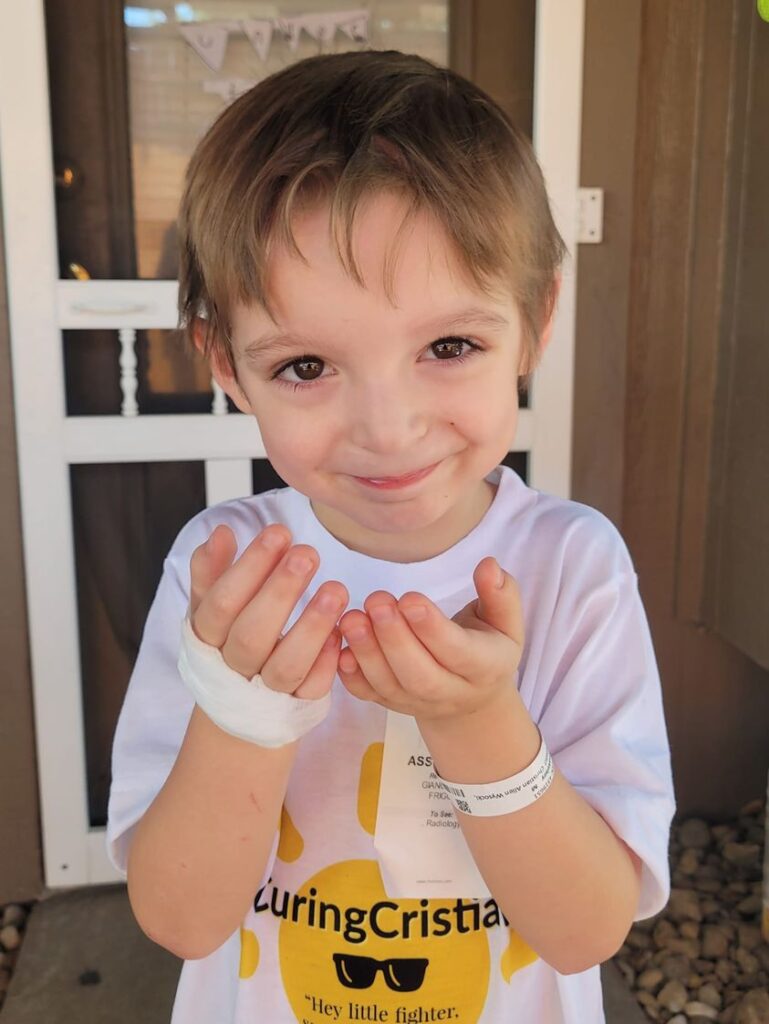
Four years ago, Cedar Hill resident Tiffany Hazlewood was excited to have a baby boy, Cristiano. Born at Methodist Charlton, she brought her son home and looked forward to him growing up healthy and happy.
But little by little she noticed something odd. “Throughout his first two years he would get sick, and at first, he responded normally. But after those first few years it would just take him a little longer to get better from things.”
When he got Hand, Foot and Mouth disease in 2019 he had it for months. “The doctor was saying, ‘Well, it’s just taking a long time – it takes a little while to get better,’ but I knew something was up.”
In 2020, Cristiano was playing with his older sister in the house and hit his head. His mother looked at him and, “I noticed that his pupils were a different size – one bigger than another.” So, she took him to an eye doctor to see what was going on. The doctor, thinking he might have juvenile arthritis, so referred her to Scottish Rite for Children, to see a rheumatologist to check his eyes. At that time, he had no other health issues.
But soon he got an abscess in his neck – a Lymph node had become swollen. “It was as big as a golf ball, but the doctor said it’ll just eventually heal itself. Or we could surgically remove it.” Because it wasn’t going away, Cristiano had it surgically removed. At that point, the doctor at Scottish Rite asked if she could do some genetic testing.
Finally: A Diagnosis
The formal diagnosis came in October of 2020. Chronic Granulomatous Disease (CGD) is a disorder that damages the immune system. It makes your body susceptible to infections caused by fungi and bacteria. It causes granulomas, which are collections of immune cells that form at sites of inflammation or infection.
This dramatically changed the family’s lifestyle because Cristiano can’t touch a lot of things a child might come into contact with: leaves, dirt, ponds, streams, hay. “The fall is about the worst time for him to be outdoors,” Tiffany explains. She disinfects the family home three times a week to keep it safe for Cristiano.
Tiffany explains it this way: “He has a faulty gene – the X-link.” Typically, the mother passes this on, so Tiffany felt a huge sense of guilt. She was tested for the gene only to discover she didn’t have it. “His was a spontaneous genetic mutation, making his case even more rare. This is a very, very rare disease. Few people have heard of it. Only three doctors in north Texas work with it.”
When Cristiano ended up in the hospital for a cold, Tiffany was referred to a doctor at Children’s “Dr. Wysocki got us in right away so he could assess him.” Cristiano’s white blood cells don’t attack the bacteria or fungus – even those in a simple cold. Instead, the cells create a bubble around it. That doesn’t kill the bacteria or make those with the disease better. Gene therapy to cure the disease is in the early stages and not ready to be used one human.

Finally diagnosed, Cristiano has been on prophylactic meds every day to keep him healthy, along with injections three times a week. Like most autoimmune diseases, the only cure is a bone marrow transplant.
They tried a family match with his big sister Gabi, age nine, but she matched eight out of 10 points of the match, and a bone marrow transplant requires a perfect 10 out 10.
The Road Ahead
Once Gabi was ruled out, Tiffany turned to the national registry. Miracle of miracles, in the “Be The Match” registry they found a 10 out of 10 match for Cristiano. “It was my sign from God to pursue a transplant that is high risk, to save my son’s life,” said Tiffany.
Tiffany also researched the hospitals with the best bone marrow transplant records and discovered the Texas Children’s Hospital in Houston was one of the top three. She wondered if her doctors in Dallas would be offended that she wanted to take her son to Houston for the procedure, but they turned out to be incredibly supportive.
“It’s kind of funny that his disease is so rare, all the doctors want to meet him,” Tiffany says.
Dr. Wysocki gave a referral for Cristiano to see Dr. Martinez in Houston in April. And now Tiffany will travel with Cristiano next week to have his central line put in at Cook Children’s in Fort Worth for the first stage of the transplant, chemo.
Because it could make him sterile, Cristiano has become part of a fertility study out of Pittsburgh that will cryogenically preserve a small part of his testicles for the future when it can be grown and produce sperm. “This is in the research phase, but it’s been done successfully in monkeys, and is now in human trials. So, we’re glad to be a part of it in case Cristiano wants to have his own biological children one day.” A grant for this medical research study pays for most of the procedure.
Family Life
While Tiffany works to keep Cristiano healthy and on the road to a cure for his disease, his dad Giancarlo and sister Gabi are holding down the fort at home.
Tiffany met Giancarlo when she moved back from Guyana where she was a teacher for a Harvard program. She grew up in Oklahoma but came back to Texas because her parents had move to Alvarado. Giancarlo came into her workplace one day and soon she saw him often since he was friends with her roommate. They hit it off and eventually moved to Ft. Lauderdale for work. But after Gabi was born, they moved back to Texas to be near her family.
Tiffany knew Cristiano was going to be a challenge when he made a crazy entrance into the world. “I was scheduled for a caesarean in a few days, but I wasn’t feeling well. Turns out, I was in labor!” By the time she got to the hospital, Cristiano was well on his way. “We arrived at the hospital at 8:30 and he was born at 9:45 – the doctor barely got there in time.”
Happily, the birth went well and the two teachers – Tiffany, certified in all subjects through 6th grade (“I love teaching math!”) and John Carlo, a PE teacher and coach of multiple sports – went home to their complete family.
Raising Awareness For the Red Cross and Be The Match
Four years later, Tiffany has become somewhat of an expert in her son’s disease.
She has a Facebook page which she updates almost daily. On June 28, she posted: “Just to keep everyone up on the timeline thus far, if remaining tests come back good, Cristiano will be having his central line put in on July 8th. Hospital admittance is the 10th and transplant date are on the 20th. Houston is so close now!!!”
As she keeps Cristiano healthy, she also hopes to spread the word about the American Red Cross needing more people for blood drives, and getting volunteers signed up for Be The Match.
“Cristiano’s disease is rare, but the need for blood – and for organ donations, bone marrow transplants – isn’t. The more I can help get the word out, the better!”
For more information on the Red Cross see:
To learn how to help others with transplants, see: https://bethematch.org
Information on ways to help Cristiano and these organizations can be found on this Facebook page: https://www.facebook.com/
Or the family’s Go Fund Me page https://gofund.me/abb6b417
Tiffany Hazlewood is happy to answer questions about the disease or Be The Match or donating blood to the American Red Cross. Thazlewood@gmail.com
CGD is a rare genetic disease that affects the immune system
In people with chronic granulomatous disease (CGD), the immune system isn’t working like it normally does. It’s extremely hard for people with CGD to fight off serious infections from bacteria and fungi. People with CGD are at a higher risk for getting serious, unusual, and repeat infections from these pathogens.
Often, people with CGD also have inflammatory problems, like inflammatory bowel disease and granulomas. Granulomas are hard lumps that build up in the tissue. They can cause serious harm to the body in places like the intestines, bladder, and lungs.
What causes granulomas?
Granulomas are caused by the buildup of immune cells in the tissue. When the immune system finds harmful things in the body, like fungi and bacteria, it sends extra immune cells to the site to stop them. When they can’t stop the fungi and bacteria, the immune cells build up and form granulomas.
People with CGD are in danger of infection from specific pathogens often found in places like gardens (in mulch), playgrounds (in woodchips), and lakes and ponds. CGD can involve any organ system or tissue in the body, but infections are usually found in these areas:
- skin
- lungs
- lymph nodes
- liver
- bones
- Life expectancy is slightly reduced for those with CGD due to the toll infections take on their bodies, but most will live to mid or late adulthood.










